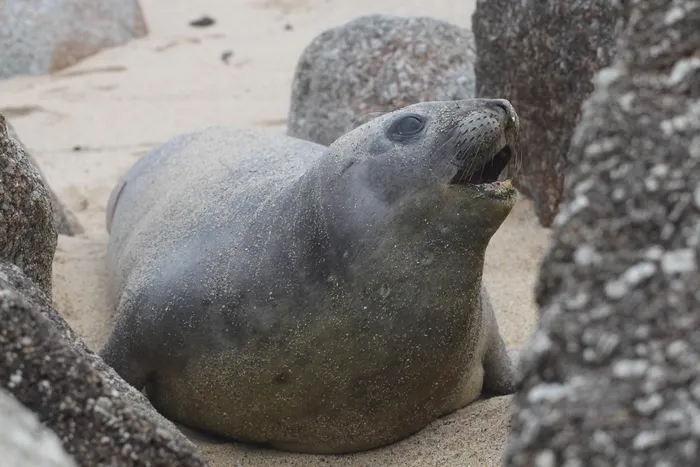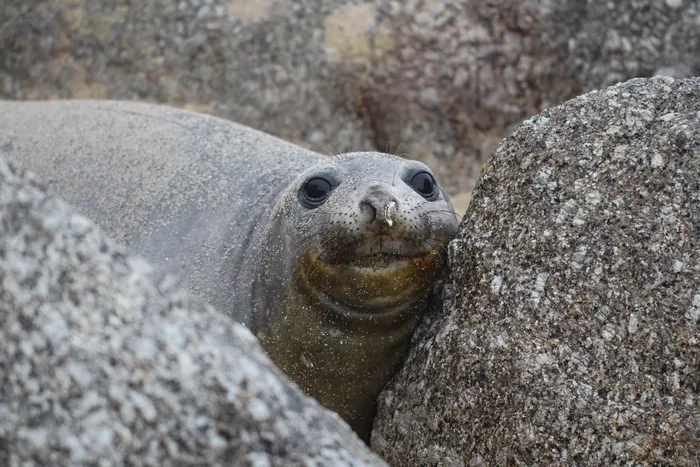Bakkies, the elephant seal, returns to Cape Town's shores

Southern elephant seal Bakkies has been spotted on Cape Town’s shores, once again.
Image: Supplied
Bakkies, the elephant seal, has returned to Cape Town's shores.
His identity was confirmed by a blue tag #17612 on his back flipper, a result of a joint effort by the South African Polar Research Infrastructure (SAPRI), Department of Forestry, Fisheries and the Environment (DFFE), and the Marine Wildlife team.
Martine Viljoen, marine wildlife manager at the Two Oceans Aquarium Foundation and V&A Waterfront, said that Bakkies was originally tagged in Bakoven in December 2024,and was last reported near Mouille Point in April. Most recently, he was hauled out at Onrus Beach.
In response to his appearance, the Overstrand Municipality’s Environmental division set up a protective cordon, and volunteers from the Onrus Vermont Special Rating Area non-profit company (NPC) took shifts to raise awareness and ensure Bakkies had undisturbed space to rest.
\Both organisations are active members of the South African National Stranding Network.
Bakkies's appearances highlight the need for public awareness and safety protocols around these "celebrity vagrants."
Residents may also spot "celebrity" vagrant elephant seal Buffel.
This marine giant has made regular appearances along Cape Town's coast for many years now, an exciting experience for the city's public.

Bakkies the elephant seal, has made a return.
Image: Supplied
City of Cape Town's coastal and environmental manager, Gregg Oelofse, said it was incredible to see the effort from the Two Oceans Aquarium marine wildlife team paying off, especially tagging and vaccinating these elephant seals.
"Had the individual not been tagged or vaccinated when it was in Bakoven, we would never have known that the same seal later seen in Onrus was already vaccinated and previously recorded.
"It really highlights the value and reward of the team's hard work, something we can all be grateful for," he said.
According to a statement by the Two Oceans Aquarium, southern elephant seals have a wide distribution in the Southern Ocean, with most of breeding and resting sites on the Subantarctic and Antarctic islands.
The closest colony of these seals lives about 2 177km away from Cape Town, on South Africa’s Marion Island.
These seals spend most of their time at sea, only hauling themselves onto land during breeding, moulting and winter periods.
Residents are urged to respect the seals' space for their safety, stay at least 20 metres away; respect cordoned-off areas by remaining behind any barriers set in place; do not pour water over the elephant seal as this causes unnecessary additional stress; minimise any noise and movement around the elephant seal; and keep all dogs on leashes to prevent any unexpected interactions between animals.
The southern elephant seals seen at a few beaches along the Western Cape coastline have come here to rest and moult. This is a vulnerable time for the elephant seals as they completely shed their outermost layer of skin and fur.
Respecting these guidelines helps protect visiting seals like Bakkies, giving them the calm needed to rest, moult, and eventually return to the ocean.
It also ensures a safe and memorable experience for all observers.
If members of the public see anyone (or their dog) harassing, harming, or interfering with an elephant seal, alert the City of Cape Town on 021 480 77 00 or 083 940 8143.